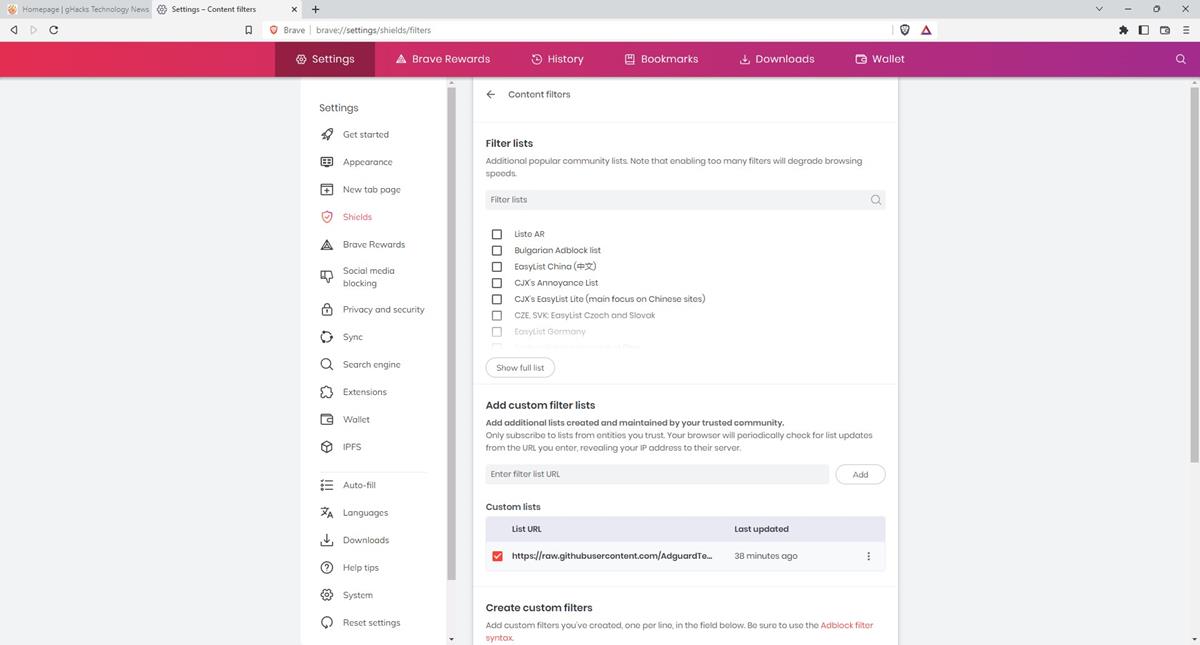Brave confirms it will support Manifest V2 extensions like uBlock Origin even after Chrome drops them

Last week, we reported that Vivaldi's ad blocker will continue working even after Manifest V3. And now Brave has done the same to reassure its users that it too will support ad blocking after the dreaded update, and Manifest V2 extensions like uBlock Origin.

Brave's ad blocker will support Manifest V3
Brave Software tweeted a message to educate people that Manifest V3 will break ad blockers, and that its own browser will not be affected by the change. A few months ago, Brave's CEO and co-founder, Brendan Eich explained that the limitations caused by Manifest V3 affects extensions directly by restricting their capabilities, but that browsers can still access the required API. This is what Brave browser will rely on to ensure its built-in content blocker continues to function.
It will change once the extended support for Enterprise is over, when Google removes said code from the Chromium project, and all browsers that rely on it will have to follow suit. Vivaldi’s developers had said that their browser would use the underlying Manifest V2 code to ensure that the built-in ad blocker continues working until Chromium removes the code. Brave on the other hand has a different approach, as it has implemented a custom ad blocker written in Rust, and hence is not limited by the same restrictions.
Brave browser and Manifest V2 extensions
There's more to this bit of news. Here's what the tweet from the company says.
"Brave will support Manifest V2 extensions such as uBlock Origin even after Chrome stops doing so."
Vivaldi had assured users its ad blocker would continue to function beyond Manifest V3, but Brave browser wants to go one step further by saying it will support third party Manifest V2 extensions. Brave's ad blocker is quite good, and in some ways better than Vivaldi's implementation, especially when it comes to the ease of adding custom filters. But uBlock Origin with its element picker, custom filters filter lists, etc., is far more powerful than a built-in content blocker with limited features. So while this could be incredible news for users and developers, I'm not sure how Brave's plans to support Manifest V2 extensions could work out in reality.
A Reddit user points out that Eich had questioned whether Google will kick Manifest V2 extensions from the Chrome Web Store, and when asked about how Brave's long term support for Manifest V2 code paths could work, he had replied that "we could fork them back in at higher maintenance cost".
He had also mentioned that Brave was open to curating some add-ons like uBlock Origin and uMatrix for a start, this seems to suggest that the browser may not support "all Manifest V2 extensions"as the tweet seems to suggest, but only a select few. That's not exactly impressive. I can only imagine that Brave could accomplish this is by either bundling the add-ons as an optional feature that users can toggle, or by hosting a web store for extensions on its website. Eich's words about hosting and curating add-ons suggest that it could be the latter.
Wouldn't it be better to open a proper extension store, similar to Opera's add-ons site? Brave launched its own search engine and partners with cryptocurrency wallets, so one might assume that the company has the resources to host its own web store for extensions. That would require some effort and willingness from add-on developers, who would have to upload and update their Manifest V2 extensions to the store. Brave would need to review the extensions in order to prevent malicious plugins from sneaking in. A curated list of specific add-ons would be easier, and financially viable, to implement.
An extension store would still only be a temporary solution. Once Chrome drops Manifest V2 completely, both Brave and Vivaldi will need to find a different way to support older extensions, or see their users switch over to Firefox.
But there's some good news, Google will drop support for Manifest V2 in 2024, as opposed to its previous plans to discontinue it in 2023. This will provide browser makers and developers of ad blockers with some much-needed time to work on their projects, to find a way to continue protecting users from the harmful changes of Manifest V3.



















I am not a tech. Just wonder why any home user wouldn’t just use AdGuard for Windows and not have to even think about all the different browser extensions that may not work due to browser code changes. Not free – but not too expensive, either.
Why do all the Brave fanboys like to write walls of text that all say the same thing. It’s bizarre, like they all went to the same school of text walls.
Amazing isn’t it. Its as if most of them are written by one person, or written by select few who are creating endless new avatars with same things repeated again and again. Must be something related to BAT gains.
Based Brave. The ONLY private browser that exists today. The man, the myth, the legend that took down Firefox. Brendan Eich. One man army.
Self sufficient browser that generates their own revenue. Has the BEST privacy options of ANY browser. Unmatched technology, and ALL the privacy seeking people USE this browser.
An in built-in ad blocker that does not rely on Google’s API. Absolutely genius. If people were to switch, but still want Chrome’s unmatched speed, stability and security. They would be coming to Brave, a Brendan Eich browser, founder of Mozilla.
He be better if he weened himself off the big tech VC Money.
@Karl
> He be better if he weened himself off the big tech VC Money.
Mozilla would be better if they weened themselves off the big tech Google money.
Would add some credibility here and there, you see.
>Mozilla would be better if they weened themselves off the big tech Google money.
Would add some credibility here and there, you see.
That’s good for Mozilla I guess, but what does that have to do with Brave and VC funding?
Brave is a UI wrapper on the same garbage that is Chromium/Chrome. You can build in anything you’d like and its still going to be inferior. Just because it may or may not be subjected to MV3 api the ad blocker is as it stands right now today is mediocre at best and lacks in just about every way to Ubo. Anyone that thinks even for a second that Google is gong to sit idly by and let other make decisions for themselves, you have to be an idiot. I truly believe that Google will break Chromium/Chrome way before they allow that to happen this will reader Brave, Vivaldi, or edge useless. Be it next year, the following year or 10 years from now.
I am not advocating for Firefox, although I am a FF user. I use the ESR version with everything stock and one extension (ubo) and have had no issue with page speed, playing videos, images, listening to music, or for that matter crashes.
Firefox is on a path that seems destined to be like Netscape and that is really sad. Google since becoming the largest market share browser is smothering all the competition albeit slowly, and everyone seems to be OK with that. Webmasters no longer make their site compatible with FF, banking institutions require Chrome, even our school district requires it and will not allow anyone to login with FF unless using Chrome or a Chromebook. US government is useless and only work for those that have deep pockets antitrust lawsuits and investigation come and go because Google, Facebook, and Amazon pay big bucks to keep those from ever reaching the court system. meanwhile google just hourds mass amounts of your data, your information, your pictures, emails, social media content, and sells it to the highest bidder.
A comment of true magnificence, and magnificently true
In my opinion the new MSN log-in has made it hard for a non-programmer to log on to the MSN Browser we had last month. When I try and log on this week, I get a screen with least 30 different versions of the past MSN single browser web page, and I cannot get a single page to use what, used to be an easy and direct log-in to be able to use the search engines. Why change coding which was working fine? Can people, using add-blockers be a reason?
Brave has the best built in adblock, but it is a super basic chromium browser otherwise if you don’t care about crypto. I also doubt Brave engineers will maintain V2 for any length of time b/c they focus all their engineering efforts on the crypto wallet, the community feature requests are either ignored or classified as very low priority according to their issues tab on github.
It’s really simple once Google removes the code for MV2/Webrequest API there is nothing that they can do about it. Many current popular extensions will either stop working, or be vastly hobbled. Even if Brave develops a Store for extensions without the webrequest api/MV2 code it would be pointless. A build in inferior blocker can be useful for the average user to rid the site of ads, but what about all the other behind the scene activity that Brave can’t or is unable to block?
Brave and even more so Vivaldi’s build in blockers are vastly inferior. Not going to bother with the Vivaldi iteration, But Brave’s version is satisfactory to a point.Yes it blocks most ads, but a broad spectrum blocker like Ublock Origin is vastly more than just an ad-blocker. The features and capabilities exceed where simple ad-blockers fail. The ordinary internet user might be content with a simple way to block ads without caring about the behind the scenes stuff that is going on and this might be beneficial to those using Brave. My opinion is that unless Brave elevates its builtin blocker’s capabilities to match the level of Ublock Origin does it really matter? Ads are not the only issue people should be concerned about.
If you use Chromium/Chrome as your base then your at the mercy of Google, even if you say otherwise. Now before you rip me a new hind quarter, Brave can enhance and possibly make their blocker better but at what cost. Make a true fork do everything in house and stop relying on Google, contrary to popular belief Google does not own the internet. You can put a UI wrapper on Chrome but in the end its just Chrome/Chromium.
Brave and Vivaldi will be dead soon enough. Possibly Opera as well. This is about Google stopping the Edge browser from gaining more market share, and they’ll probably stop at nothing to win, up to and including killing chromium altogether.
Edge is an existential threat to Google. If people buy their new laptop and it already has a browser that works as well as Chrome, and already has a search engine that works almost as well as Google, then it’s game over on the desktop.
The only question will be if Chrome can survive on mobile. But they’ll introduce so much harm to the code to try to stop Edge, that they may not survive on mobile either. If Google ever falls to less than 50% of the browser market and less than 50% of the search market, the company won’t be able to survive as it is currently configured, I don’t think. The company would basically be reduced to a streaming video service with a bit of webmail and an aging and increasingly unnecessary search service.
@Andy Prough See the comment of Iron Heart: Brave’s internal adblocker would continue to work even if Google completely removed extension support from Chromium!
One more option is people stay with Brave and Vivaldi by abandoning V2 extensions and installing a stand alone app like AdGuard for Windows.
And the question remains: how long will Firefox support V2 extensions?
In other news: Brave has added a reading list. It is a bit clumsy at the moment in that you have to disable it to see all the different options in the menu, but still a valuable addition.
@Sebas
I don’t think there is much point to talking with @Andy Prough. Andy is here to promote / shill Firefox, and when he is being called out on it, he hides behind the facade of being a Pale Moon user (wonder how they like Firefox shills like him over there at the Pale Moon forum, last time I checked they were not too popular over there, or is he not playing salesman for Firefox over there?).
If you ask me, Mozilla giving up and adopting Manifest V3 is much more likely than Brave ever losing its native adblocking capabilities. Brave Software has prepared for the “Manifest V3 scenario” by implementing a native adblocker which they are successfully maintaining – it will not go away, no matter what Google does with the extension APIs. What about Mozilla though? Firefox does not block ads by default at all, they leave the job entirely to extensions. Extensions depend on their APIs, and Mozilla has already pulled the rug from under their extensions once – when they switched from XUL / XPCOM extensions to WebExtensions. The WebExtensions APIs Firefox supports now are pretty much copy and paste from Chromium’s APIs, this also includes the webRequest API. There are only very very few APIs Mozilla came up with themselves, so with Google no longer maintaining the webRequest API, a healthy amount of skepticism regarding Mozilla’s ability to do so is reasonable. Add to that the fact that Mozilla is heavily involved in a working group for extension API standardization (Apple & Google also take part there) and the heavy monetary influence Google has on Mozilla, and one’s optimism quickly dwindles. I’ve said it before and I will say it again, Mozilla and maintaining the webRequest API: I believe when I see it.
@Andy Prough is “worried” about the survival of Chromium-based browsers, I think he should worry more about whether or not Mozilla can hold onto their remaining 3% market share, it’s not looking too rosy over there indeed. Native adblockers will always be possible as Google can’t possibly remove the network stack from the browser (the browser can’t establish any connection whatsoever without this component) – they played their trump card for extensions now and that’s that, there is no realistic way they can break native adblockers. Also, unrelated to native adblockers, @Andy Prough talks about maintaining the webRequest API as if this means that Brave will have to hard fork Chromium and maintain the entire browser going forward, this is just not the case and a fairly ridiculous idea.
No, I use Brave when Pale Moon won’t render a page. Which is rare.
But I think that Brave is standing in quicksand, and that Google intends to gleefully destroy the chromium base it’s standing on. Like a lot of people I’m going to test Firefox+Arkenfox and Librewolf to see if either of them will capably replace Brave.
I think Brave (and Vivaldi and Opera) will be basically dead within the next couple of years. Google sees the threat that Edge can be, and it’s probably willing to kill the entire chromium project rather than see Microsoft win with Google’s own code.
@Andy Prough
> But I think that Brave is standing in quicksand
Based on what? Am I speaking Chinese? Read my comment again:
Google CANNOT remove the network stack from Chromium, this would mean that the browser could not establish ANY connection AT ALL, it would go offline and cease to be a web browser. Brave’s internal adblocker DIRECTLY interacts with the network stack WITHOUT the need for extension APIs. Other core features of Brave do not rely on extension APIs either, not sure what you are alluding to.
And a codebase is not a war zone, you are not a developer and it shows.
> Like a lot of people I’m going to test Firefox+Arkenfox and Librewolf to see if either of them will capably replace Brave.
The way you are shilling for it you are a Firefox user and always have been. Your shilling is just a bit more covert than usual.
> I think Brave (and Vivaldi and Opera) will be basically dead within the next couple of years.
Based on what? Reads like a wet dream of a Mozilla fan, not going to happen.
> Google sees the threat that Edge can be, and it’s probably willing to kill the entire chromium project rather than see Microsoft win with Google’s own code.
If Google hard forks Chrome away from Chromium and only patches Chrome going forward, we would still have the last open source state of the code. Any entity including Microsoft could hard fork this as well. Smaller entities like Brave Software or Vivaldi Technologies will either be big enough to do the same by then or will cooperate, or use whatever Microsoft does in case they open source their fork.
This is a scarecrow scenario though because 1) Google can already create a closed source browser from the Chromium open source code, it’s called Chrome, while 2) still profiting from outside contributions to the open source Chromium base.
I also believe Edge’s success will have its limits due to the impossibility to sync Edge with Android’s Chrome.
@Andy
What do you mean by “basically dead”? How could google tackle the Edge threat? A genuine question.
@Ashwin –
>”Once Chrome drops Manifest V2 completely, both Brave and Vivaldi will need to find a different way to support older extensions, or see their users switch over to Firefox.”
Users are already switching over to Firefox+Arkenfox or Librewolf in advance of these moves. It’s probably too late for some of the chromium-based browsers to survive over the long run.
Today, 29/9/22, the Dutch website security.nl has this news about Brave: Brave browser lets users block cookie banners by default. In the current Nightly version of Brave and version 1.45 coming out later this month, users will be asked if they want to block cookie banners.
@Lian you’re right. The covering of all things Brave is lacking. Now, with V3 coming it behaves a tech site like ghacks net to give not only accurate coverage but also enough coverage. And the same goes for Vivaldi. Case in point: I was the one who pointed Martin out that Brave now has a translation function. Onley after that he covered that news. This not about me it is about ghacks net falling short.
I do’nt know. I am becoming less interested in ghacks net. It ‘s like they fell short of their former high standard. Not always, there is still good coverage but to me it seems something has changed and not for the good.
Why don’t Brave, Vivaldi and Opera team up to keep support for important Mv2 extensions such as uBlock Origin and Violentmonkey alive? Opera’s extension store is older than Chrome’s, so this could be a way to host these extensions.
Do people really research and really know what they are talking anymore?
First you (ghacks) make claims about Vivaldi adblocker saying it will not be affected by Manifestv2 removal, which is not true, and Vivaldi is not even sure about it, they are clueless, someone is working in sync and can’t improve the adblocker… because apparently they have like 2 people working on the browser’s features while probably their CEO is living in a nice condo in USA getting all the money from Microsoft’s Bing deal, instead of hiring people.
And now you say ignorant claims like “but it is pretty much exactly what Vivaldi’s developers mentioned recently. Both browsers depend on the underlying code to access webRequest for their built-in ad blocker to work.”
Do you understand Brave built Brave’s adblocker from the ground so it doesn’t use WebRequest???????
Did you even try to research that?
Do you understand why Brave can support CNAME uncloaking and no other Chromium browser can? they re-built the adblocker with RUST after Manifestv3 was announced. It just won’t get affected one bit about Manifestv2 or v3 or v4.
Unlike mediocre Vivaldi’s adblocker which barely supports any feature.
Please gHacks you are a tech blog, stop spreading misinformation, learn to research before you make claims.
If you don’t know the answers, ASK people at Brave who knows, even Brendan can CC people to explain you things.
Brendan doesn’t know everything that is going on, he literally doesn’t even know why Brave has a uBlock fork in place, the guy Brendan CCed explained him it was just for the resources, not for anything else, Brave doesn’t use any uBlock code or anything.
Even if he is the CEO, he doesn’t know everything around the company.
So you have to make sure you get the information right.
WebRequest or DeclarativeNetRequest is NOT used by Brave’s adblocker, that’s why Brave adblocker blocks everything before uBlock, unlike Vivaldi, which doesn’t do anything if you have uBlock enabled (it does sometimes and ruins anti-adblocking detection from uBlock).
Stop bringing Vivaldi lame adblocker and blogpost with a bunch of “hopes manifestv2 removal doesn’t brake our adblocker too much” when talking about Brave.
Just stop! this is getting ridiculous, you are really not even trying to research a second the information you write.
Better just link to Brave’s tweet and let people ask questions, Sampson, Brendan and others will give people more accurate answers than you are able to.
Your information is inaccurate in many levels, just open an reddit account and go there and be yourself dude… in a way this is even worst than reddit 99% posts.
If you don’t want to, at least you can get somewhat simple and accurate information about Brave adblocker
Question #21 https://community.brave.com/t/some-of-your-questions-answered-recap-of-community-call-from-09-20-2022/433843
It is not a deep answer, but since it seems you didn’t bother to go to https://github.com/brave/adblock-rust and the other repositories related to adblocking and shields and even the Brave’s core one, to write accurate information, at least you can read the simple answer from Saoiray and try to understand what you are even talking about before writing a comment.
I am sorry but this is just ridiculous, you are literally giving 100% wrong information to people about many topics here.
Ashwin and Martin: do you have a profoundly dislike to Brave? That’s how it seems over the past few years. It’s okay, just a question. Alles Gute aus Die Niederlande. Leve Brave!
For this scheme to work, Brave would have open and maintain their own extension store. Could Brave attract extension devs with such a small userbase?
Another question would this (albeit minor) forking from Google’s code cause Brave to release security updates slower? Will Brave become a Google Chrome version of Pale Moon?
@Aluminium
Like Pale Moon? I don’t think you know what being like Pale Moon entails. Pale Moon is not only about keeping XUL add-ons going, you see. They also port the Firefox 4 – 28 native UI over to newer versions, they are against the multiprocess architecture, they refuse to use Rust etc. Keeping the webRequest API (which is not the same as the entirety of Manifest V2 either) is much smaller in scope, so no, Brave will not become “the new Pale Moon”.
@Aluminum
They are not planning to have an extension store, you make it sound like if you can’t sideload extensions, which is how people will be able to get manifestv2 extensions if they desire.
They could still have a mini-curated extension store like the old times, which means, uBlock and Adguard, because let’s be honest, people are just crying about those two when it comes to MV3 even if the developers are moving on and working in MV3 extensions.
Brave is not going to support Manifestv2 forever… that’s nonsense to think Brave wants to become like Pale Moon, supporting extensions that nobody really cares today because developed moved on. Of course, there was a big difference between what Firefox had before and limited webextensions, which is not the same case with MV2 vs MV3.
But Brave will only support manifestv2 until 2024… then once it is gone, it will be gone. That gives people choice and developers time to work in their MV3 extensions more, and that is good, because let’s be honest, Google is too big for people to understand that developers will switch to manifestv3 even if they complain about it like happened to gorhill, so, if manifestv2 support still exists at least for a year, then being able to use it while mv3 ones become better it is what people can do with Brave if they desire.
In the end, it’s not like Brave doesn’t have its own adblocker, and Brave of course has to work in their adblocker to bring the few missing important features to achieve an almost 100% compatibility with uBlock filter lists. Not far from it, but still some important features missing for sure, which is what would benefit for android users anyway, it’s not like Brave only runs on desktop, so the adblocker is important for Android version which doesn’t support extensions.
Such a pity that Brace can never be trusted. Too bad they steal your data. Oh well, Firefox it is.
@Guest
You post this claim repeatedly, without being able to substantiate it:
https://www.ghacks.net/2022/09/20/firefox-105-is-out-here-is-what-is-new/#comment-4549429
Note that I will always point this out (your lack of sources) when you make this claim. Enjoy.
PS: Parts of the Firefox community are getting desperate enough to resort to bullshit claims, you just love to see it.
But for how long? And not just Brave, but Vivaldi and Firefox and everyone else… there’ll come a time where maintaining v2 won’t be feasible.
I still think content blockers will have to transition to standalone apps to survive in the long run, to not be dictated by Google’s whims. AdGuard already does this but it’s not free.
But I don’t understand why? Why google removing it affects other browsers? It’s a feature of a particular set of programs, not a web standard according to which it’s built on?
They already said 900 times, especially Brendan Eich who is not hard to find using Twitter’s search.
They will support Manifestv2 until Google removes it completely, that means, from the Enterprise which Google extended to 2024.
So there is the obvious answer, It is impossible for Brave to maintain a feature that was completely removed just like that and for every new Chromium version Google pushes. it just doesn’t work like that.
Vivaldi never said they would maintain anything, just look at the team, it is barely any big to do such thing, so you would have to wait and see if they really do it or not.
Brave’s adblocker doesn’t depend on Manifestv2 or v3 like the article implies, Brave doesn’t need it in their true native implementation made in RUST, so Brave already does, better than Adguard, because Adguard still needs an extension to truly block elements inside the page.
That’s what I don’t understand from people, they apparently don’t understand why DNS adblockers are limited, even if it is obvious. DNS can only block per domain, you need still need the API as a non-native core element, to see each element in a page to truly block Youtube, Twitch, and many other types of ads, you know, the ones that run in the same domain as other services, you still need an ablocker to hide the leftovers, to do many cosmetics. You literally can’t do that with a DNS-based adblocker, that’s why I don’t understand why people can’t just grasp.
You can’t block ads in youtube.com domain with DNS without blocking the whole youtube! That’s why extensions are important, that’s why Adguard would need still an extension, and they still need to make it Manifestv3 to be able to block all the elements because unlike Brave, they won’t run native inside the browser.
So Brave is the ONLY one Chromium adblock (native or Extension API) that has been able to do it.
Even my Firewall can block by IP, you get something like Simple DNSCrypt, and then you can block by domain. so Adguard has done nothing special, I mean, they are okay but there are so many ways to do DNS adblocking, even the Host file can do it.
So for Adguard to truly block ads, they will need manifestv3 which they are already doing it. a “standalone” implementations is not going to do anything against most ads, about most annoying things and tracking scripts on the internet and modify websites and do whatever they want with it.
I don’t expect people to know Brave’s or uBlock or Adguard advanced features, but you can literally modify so many things in a website, it is just ridiculous to think ‘stand alone’ matches what you can do if you have access to every individual connection and element in a page.
Zhin Wings is right. Manifest V2 will only be supported until Chromium disable the enterprise flag supporting it.
This is why Brave doesn’t support extensions on mobile due to the hardwork it would take to rebase it all the time. See Ungoogled Chromum Extensions by wchen, which is no longer updated.
@Ray
> This is why Brave doesn’t support extensions on mobile due to the hardwork it would take to rebase it all the time. See Ungoogled Chromum Extensions by wchen, which is no longer updated.
Well there’s Kiwi, which is essentially developed by one person. And it uses a much newer Chromium base (Chromium 105.x) than the last Ungoogled Chromium for Android that supported extensions (Chromium 88.x).
I don’t trust Kiwi. I know the dev needs to support himself, but the search engine fiasco, as well as disabling (ad) extensions on certain pages lost my trust. Not sure if Kiwi is still like that though. If the dev was transparent about this, then I would still be using Kiwi as a secondary mobile browser.
@Ray
> but the search engine fiasco
You do realize that you don’t have to use the bundled search engines, right? Example: You go to duckduckgo.com manually and then you perform one search, what will happen? DuckDuckGo will appear as a new entry at the bottom of the list of search engines, and this one does not use the proxy connection of the bundled DuckDuckGo.
> as well as disabling (ad) extensions on certain pages
You mean search results pages? I am afraid small browsers never get a search deal if you insist on blocking ads on the search results page. :/ That’s just the reality of things. I mitigate this by using search engines that don’t do personalized ads – I only use search engines that do ads strictly in the context of the search term, which means not Google or Bing.
I agree though that this is a privacy issue on Google or Bing.
I think both of your complaints do have sensible mitigations – however, this was not the topic of your first comment, right? You said it’s practically impossible to run extensions on Android Chromium, correct? And that’s why the Ungoogled Chromium fork for Android gave up on it? Well, I don’t know what the Ungoogled Chromium for Android developer is doing, but Kiwi is still running extensions on Android just fine as of Chromium 105.x.
PS: Chromium-based alternatives to Kiwi would be Bromite or Brave, however no extension support there.
@Iron Heart
> You said it’s practically impossible to run extensions on Android Chromium, correct?
I did not say that.
@Ray
“This is why Brave doesn’t support extensions on mobile due to the hardwork it would take to rebase it all the time. See Ungoogled Chromum Extensions by wchen, which is no longer updated.”
Sounded that way to me. No idea what is going on with Ungoogled Chromium, if Kiwi can still patch it in, I am sure they could too.
I’m a Ungoogled Chromium user. This past week or so I have tried every other viable browser extensively and came to the conclusion that when Ungoogled Chromium ditches Manifest V2, Brave is the browser for me. In the end Vivaldi and Librewolf were its main competitors, all the remaining browsers: The wheels fell off pretty early in the race.
@Ashwin
> Brave’s ad blocker will support Manifest V3
I think you could have phrased this better, Ashwin (example: Brave browser will support Manifest V3 in the future), the way it stands this is highly inaccurate. Brave’s internal adblocker, called Brave Shields, directly interacts with the network stack of the browser without calling ANY extension API (be it from Manifest V2 or V3)! It would continue to work even if Google completely removed extension support from Chromium!
In addition to the native adblocker of Brave, the browser will support the following third party extensions:
– adblockers based on Manifest V3, since Brave will adopt all Manifest V3 APIs that extensions need to use in the future.
– adblockers using the webRequest API from Manifest V2, at least as long as it is viable to maintain the webRequest API on a codebase that would normally not support it anymore
The way this article is phrased makes it seem like Brave’s native adblocker uses extension APIs now and will use Manifest V3 in the future as its base, neither of which is the case.
Addendum… From the article:
> Both browsers depend on the underlying code to access webRequest for their built-in ad blocker to work.
This is inaccurate at least for Brave.